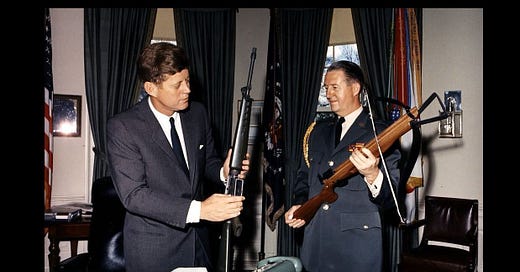With the John F. Kennedy assassination in the news again after half a century, the time seems ripe to add my mite to the mountain of speculation and reminiscence.
Teaching in a small Virginia college in the ‘seventies, I was intrigued enough by the plethora of guns around me to pitch a book about the American love affair with personal artillery. A New York publisher ponied up a modest advance, and I began beating the bushes for material.
I even bought a gun myself; a pretty little Browning .380 auto at the local Kmart. There was a form to fill out, of course. As I remember, it posed three questions; are you a convicted felon, are you crazy, and do you intend to shoot anyone? Three negative responses produced a beaming “Waal, awl rahrt - and y’all have a nice day, y’heah?” But at the check-out, they were a lot more cautious. “You wanna pay by cheque? Is this a local cheque? You got photo ID? Look straight at the camera, please.”
Telling myself it was research, I drank in downtown bars where I was far from the only person armed. I drove an old Ford Fairlane, taking it to the seedier drive-in cinemas on Saturday nights, where my student girlfriend and I made out in the back seat, watching slasher and biker movies as rats scuttled across the potholed asphalt, sending empty beer cans rattling as they scavenged for pizza scraps and popcorn.
I knew a nurse in New York who could give me entree to its hospitals, and the temptation of all that blood and panic was just too great. If you want to see the American love affair with the handgun at its most intimate, let me recommend a busy Saturday night in the emergency room at Brooklyn’s Kings County.
My professorship opened lots of doors. The local police let me cruise with them, and observe as they cleaned up after the killings that gave our town the eleventh highest per capita murder rate in the country The captain in charge of homicide trusted me to handle his sidearm, and led me around the station basement, its walls lined with pigeon holes, each containing a confiscated hand-gun. A tea chest accommodated anything larger – some swords and machetes, miscellaneous bayonets, and what looked like an assegai.
From one alcove, he extracted a double-barrelled shotgun, sawn off at barrel and stock to create a weapon small enough for an overcoat pocket.
“Will you just look at that,” he said in disgust.
“Awful.” I could visualise the spread of shot, the terrible impact….
“What kind of damn fool,” he went on, “would mutilate a beautiful Purdey 12-bore like that?”
I saw my cue. “Man’s a savage,” I growled.
The captain, I soon learned, was a stalwart of the NRA. So was the medical examiner, a scholarly man who collected Lugers. With their recommendation, there was no problem in getting an interview with a senior officer of the Association in Washington DC.
Few college professors showed interest in the NRA back then, and my welcome was cordial. Armfuls of literature were pressed on me. I was particularly taken by the NRA Christmas cards, with a genial Santa hefting a sack of metal mayhem and halls decked with holly and hardware.
Tentatively I raised the question of gun control, about which Senator Ted Kennedy was being particularly vociferous that year. The NRA man sneered. “Here’s something you might find interesting,” From a locked cabinet, a fat file was produced. Its first item was a black and white glossy of a grinning Ted Kennedy, in search of votes in some forgotten election, flourishing a pair of .45 pistols.
“I happen to know,” said my helper, with some relish, “that Jack and Bobby would go out onto the Potomac in that boat of theirs, the Honey Fitz, and plink bottles and cans with a .22.”
He extracted a letter. “And you’ll find this particularly interesting.”
The letter on Congressional letterhead was from young Senator John F. Kennedy. He’d been invited, it explained, to go shooting with Lyndon Johnson on his ranch, but lacked a weapon. As a veteran and a legislator, he was entitled, he understood, to a free rifle from the stock of retired weapons in the national armory, and would like to exercise this right.
“We cleaned one up for him,” said the NRA man, “and sighted it in for him specially. But imagine…a man like Kennedy. With all that money. They’re like that, though; millionaires. Cheap.”






The like was for the story not guns🧐